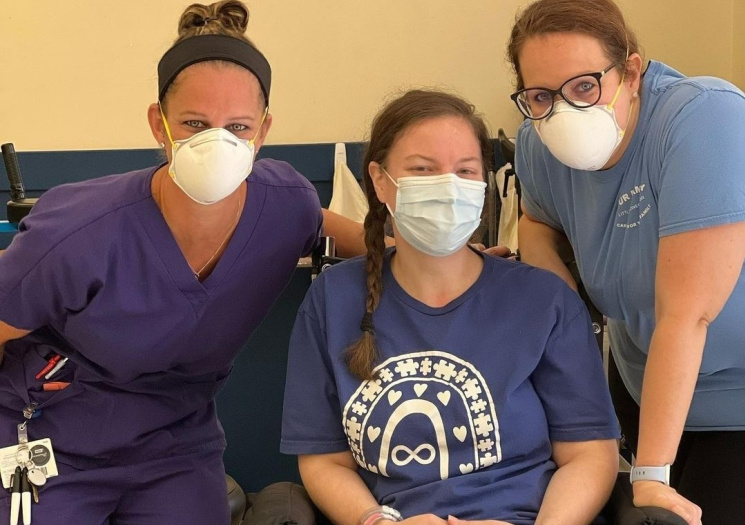- Find a Provider
-
Services
-
Redeemer Health provides compassionate care across every stage of life.
- View all Services
- Health Care
- Cancer Care
- Heart Care
- Hospital at Home
- Maternity Care
- Pediatric Urgent Care
- More Health Care Services
-
- Patients & Visitors
- Locations
- Careers
A Challenging Case Leads to Inspiring Outcomes at Little Flower Manor
February 13, 2023
categories:

Ask Brandi Michalenicz how she’s doing, and she’ll say, "Livin' the dream."
Her response speaks to the strength and resilience of her spirit. Just a few short months ago, the 33-year-old couldn’t lift her head or move her arms and legs—and it wasn’t clear she ever would again.
She found help from an unexpected source: Little Flower Manor, a skilled nursing facility in Darby, part of Redeemer Health.
A special education teacher at MaST Community Charter School in Northeast Philadelphia, she took students on a field trip to the Philadelphia Zoo on the Thursday before Memorial Day. On Friday, Michalenicz was at home cleaning and doing errands. She sent her one-year-old daughter, Arwen, off to daycare, and by noon, she had cleaned her home and done the grocery shopping. That’s when she noticed it.
“All of a sudden, my legs started feeling very heavy,” she says. “I just thought it was muscle fatigue from walking around the zoo all day.”
Saturday came. Her legs were heavier. So were her arms. She knew this was more than tired muscles. “I teach, so I’m active all day,” she says. “A field trip really should not have exhausted me that much.” By Sunday she couldn’t carry her daughter upstairs for a diaper change.
A Monday visit to urgent care showed only a slightly elevated white blood cell count.
On Tuesday, she didn’t feel safe making the long drive to work from her home in Clifton Heights, Delaware County. It wasn’t getting better. It was actually getting worse. She and her husband made a trip to the ER, and the hospital kept her overnight for observation. Michalenicz was at a loss. “I’m very healthy. I’ve never even had the flu. I don’t get sick.”
The next day, she underwent a nerve conduction study, which measures how fast an electrical impulse moves through your nerve. The doctor said without hesitation, “You have Guillain-Barre.” Michalenicz’s first question: “What’s Guillain-Barre?” She learned that the myelin sheath around her nerves was coming undone. Guillain-Barre (gee-YAHN-buh-RAY) syndrome is a rare disorder where the immune system attacks the nerves.
That night, Michalenicz was started on intravenous immunotherapy. She would have five nights of treatment at a hospital. “When I woke up Saturday morning, I could not get out of bed,” Michalenicz says. “It was horrifying.” She finished treatment, but her condition continued to worsen. “My arms got to a point where I couldn’t move them,” she says. “I couldn’t lift my neck.”
On the last day of the second round of infusions, Michalenicz woke to find she could shake her foot. “After a month of not being able to move, shaking my foot was astronomical,” she says. “I very slowly started getting better.” Still, she couldn’t go home. The answer: a skilled nursing facility.
When the hospital social worker gave her a list of facilities, she saw that Little Flower Manor is in Darby, only seven minutes from her home. Her husband could easily visit and bring Arwen. And it was among the highest rated on her list. Her decision was made.
In the midst of her ordeal, Michalenicz received additional news: She was pregnant.
Little Flower Manor’s chief administrative officer Rosemary Port, RN, remembers when Michalenicz arrived. “She couldn’t take herself to the bathroom, she couldn’t hold the utensils, everything was so heavy for her,” says Port. “She was so weak, and she was also pregnant. We had two lives we were concerned about.”
Michalenicz wasn’t a typical patient for Little Flower Manor. “You don’t expect somebody so young in a nursing facility,” Port says. “Our average age is 82.” Nonetheless, she says, “We broadened our scope for her, and I’m glad that we did. We had to help.”
Port adds, “Our mission is to take care of people. And Brandi’s from our neighborhood. That’s what community is all about.” While she had concerns about Michalenicz’s condition, she also had confidence in her team. “I had no doubt that, if given the chance, they could get her back with her family,” she says.
She credits the talent of her therapy team. When Michalenicz arrived, they got right to work. The first step was trying to get sensation back in her legs, Port says. They used a machine called a TRAM (transfer and mobility device) that lifts and supports patients while simulating walking. “We couldn’t go very far at first, but she felt elated that she was actually on her feet again,” Port recalls. “She was dressed in her regular clothes and she had sneakers on, and to her that was huge progress. I think just seeing that there was potential gave her hope.”
Once Michalenicz started to progress, there was no turning back. “Every week, she got stronger and stronger,” Port says. “It was amazing. Once she hit her stride and we saw her walk about 50 feet, everything started coming back. Nobody was more determined than Brandi,” she says. “She had a quiet strength about her.”
“They were amazing,” Michalenicz says. “They were so encouraging. When you have somebody else cheering for you, it’s so much easier.”
When she left Little Flower at the end of a month, Michalenicz could walk 150 feet with the help of a walker, dress herself, and get into a car. “She looked great,” Port says. “She was doing wonderfully when she left.”
Michalenicz has continued to progress at home. “I have to plan out how many times I’m going to do the steps in a day. I have difficulty crouching down. I’m not going to be doing any squats anytime soon,” she says. But those minor limitations are eclipsed by enormous milestones like returning to work. “I’m cleaning the whole house,” she says. “I’m going grocery shopping. I’m driving—which was a big thing. I’m lifting Arwen. I remember when I couldn’t lift a piece of paper, and now I’m lifting my 25-pound child.”
She credits faith and prayer with getting her through. She also credits her own fortitude, along with the encouragement and talent she found at Little Flower Manor.
“We got her home,” says Port. “And I can’t tell you what a morale booster it was for us to be able to do that. She just had this quiet courage and strength about her, and we all appreciated that,” Port says. “They looked to her as a role model.” She is somebody we will remember for quite some time. She gave us a lot, maybe even a little bit more than we gave her.”
Call 610-534-6000 or visit here to learn more about Little Flower Manor.



